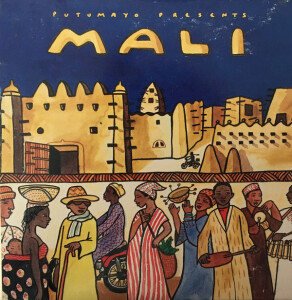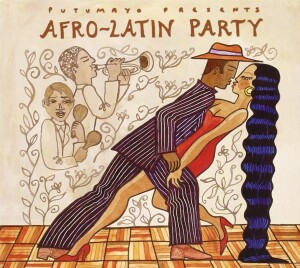The Putumayo label — along with various ventures by Peter Gabriel and Ry Cooder, the Rough Guide recordings and broacasts on BBC World Service by Andy Kershaw and Charlie Gillett, to name some of the most prominent influences — has helped an alert public in North America, Europe and Australasia to become aware of so-called world music. We no longer find the music of Africa, the Arab world, the Indian sub-continent and Latin America outlandish or even unfamiliar. This is obviously true of the popular music in those regions, which has added electric guitars, basses and other imported hardware and musical influences from the developed world, but our ears have also become increasingly attuned to the more traditional sounds from the “third” world. Putumayo issues an astonishing series of recordings of great quality. These are just two of those published in 2005.
 Putumayo World Music Presents: Mali
Putumayo World Music Presents: Mali
The music of Mali is widely known, partly through the discovery of the apparent relation between some traditional Malian forms and the American blues, which led musicians such as Taj Mahal and Ry Cooder to collaborate with musicians from Mali and underline their common roots. But the wide availability of Malian music has familiarized listeners outside Africa with other local genres, ranging from highly traditional music played on traditional instruments to more sophisticated and eclectic African rock and pop that use more recognizable formats and instrumentation. This Putumayo compilation underlines the variety of sounds on offer in this country of less than 12 million people spread over a territory twice that of Texas, over half of which is desert.
If you put the CD into your computer rather than the hi-fi you will receive a special treat: a live performance by Habib Koité and his band Bamada of “Batoumambe,” a song about love across ethnic boundaries. Koité and his musicians represent for me all that is best about contemporary Malian music — and it really is Malian in the fullest sense, for unlike many African artistes, Koité steps outside the ethnic traditions of his own northwestern district and brilliantly combines elements from the different regional styles found in the country. There are intricately picked acoustic guitars that nod towards a Western folk style, but also traditional percussion and, very prominently, a balafon, the xylophone of West Africa. This is popular music, with an alluring, danceable rhythm, but created with an awareness of and a respect for Mali’s tradition.
Such is Koité’s prominence that he also appears twice on the audio section of the CD, the only musician to do so. His two songs, “Kanawa” and “Saramaya” (the latter recorded live and showing some influences of reggae) where harmonica and guitar meet the balafon and African drums, provide further proof of the dynamic appeal of this great band.
Koité’s superb balafon player, Kélétigui Diabaté, also appears in his own right, playing an instrument that he built himself, in duet with Koité’s guitar, on the track “Koulandian,” a well-known traditional hunting tune of the Mandé people. Incidentally, in its alternative spelling “Kulanjan,” this is the title of a CD by another great Malian musician, the kora player Toumani Diabaté. Toumani does not appear on this CD, but another member of the far-flung Diabaté family of musicians performs on kora on “Maninda,” a track sung and played by Moussa Diallo and his group. Diallo was born to a Danish mother and has spent part of his life in Denmark, but, like Habib Koité, his music is firmly rooted in Malian soil.
The links with the blues are all too apparent on acoustic guitarist Idrissa Soumaoro’s “Ouili Ka Bo,” where the French harmonicist Pascal Mikaelian sounds as though he has been listening to Little Walter. There are echoes of the blues too in the song “Amassakoul ‘n’ Ténéré” by the band of desert-based Touareg calling itself Tinariwen — which actually means deserts. The greatest of all Mali’s electric guitarists, Ali Farka Touré, who died last year, came from Timbuktu on the edge of the desert where the Touareg live, and although he is sadly absent from this CD, his influence is heard here.
Malian pop music, like pop everywhere, cannot escape ouside influences, and a good illustration is the song “Gembi” by female singer Ramatou Diakité. There is not only a potent mix of kora and African drums with electric guitar, bass and Western percussion, but also vocal harmonies borrowed from South Africa. The kora is a kind of cross between a guitar and a harp made from half a calabash. It plays an essential part in West African music. Another Diakité, this time Tom, performs his socially engaged song “Fala” (orphans) in a way that shows even more contact with outside influences, reflecting the time he has spent outside the country, both in Africa and Europe. I don’t know who plays the stunning electric guitar on this song but there was not enough of it for me. Issa Bagayogo is another Malian prepared to experiment by blending electronic technology with his country’s musical traditions, resulting in a rhythmic performance on “Bana” that would not be totally out of place in a discothèque, while being vocally firmly in the local tradition. In similar vein, Mamou Sidibé is a female singer who uses the tradition-technology blend to produce fresh and engaging pop.
Some listeners may be less interested in this shiny contemporary Malian pop music, but in almost total contrast with such fusion music is the contribution of the celebrated traditionalist, Boubacor Traoré. I say almost total, because even Traoré bows to globalization by featuring Régis Gizavo, an accordionist from Madagascar. The CD’s producers express their regret that they could not include tracks by Oumou Sangaré, Salif Keita and Rokia Traoré, for copyright reasons, and to this list I would add Ali Farka Touré and Toumani Diabaté. But as the producers point out, the CD contains a wealth of Malian music, and even if not every track will suit every taste, there is enough good music here to please every lover of Malian sounds. For me, as you may guess, it is Habib Koité who steals the show. Highly recommended.
 Putumayo World Music Presents: Afro-Latin Party
Putumayo World Music Presents: Afro-Latin Party
Long before any of us were consciously listening to African music, we were already absorbing its rhythms and percussion. The dance music of Latin America, especially Cuba and Brazil, interfaced with jazz and provided a fertile source of dance music for North America and later the rest of the world. All of which helped to prepare us for the “world music” explosion decades before it happened. Putumayo’s Afro-Latin Party brings together a very wide selection of music that can be put under this heading, including musicians from both South and Central/Caribbean America and from Africa, as well as, more surprisingly, the U.S.A. and Spain and, astonishingly, a band from Croatia.
Several of the cuts bring together music from both sides of the Atlantic. Anyone who has visited West Africa will know how Cuban music, itself full of African influences, re-crossed the ocean to influence the urban music of the region. Africando, the band that kicks off this CD, arose when a Malian musician, Boncana Maïga, who acquired his musical training in Cuba, returned home to form a band of West Africans. The fit is perfect. Africando performs two further songs on the CD, using a different singer each time, and the band constantly captures the authentic Cuban rhythm with just enough of Africa in the mix to make it that little bit more fascinating.
At the risk of sounding repetitive, anyone who has visited New York will know how Puerto Rican salsa, with African influences similar to those found in Cuba, has settled in the metropolitan U.S.A. and combined big-city sophistication with the tropical exuberance of its origin. José Mangual Jr, son of one of the many Puerto Rican percussionists who hit the modern jazz scene in the USA after World War II, gives a copybook performance of contemporary salsa with “Ritmo Con Aché.”
Almost perfect in its fidelity to the real thing is the splendid mambo “Cuentamé Que Te Pas”” performed by Pepe and the Bottle Blondes. Pepe is a Spanish singer who formerly worked with the band Pink Martini in Portland, Oregon, whose own Afro-Latin pastiches are marvellous. Here Pepe and his collaborators produce a beautifully precise Cuban-style number with Brazilian overtones in the singing by the (American) Bottle Blondes. However, not all crossovers and unlikely combinations appeal so strongly to me, and this was the case with the band calling itself Ska Cubano, whose members are drawn from Cuba, Jamaica and Britain. Their Latino reggae (or ska) number “Babalu” seems to me a little contrived and ponderous when compared with the lightness of most of the other tracks: it may have seemed a good idea but perhaps near neighbours do not always make the best fusions — although one can only speculate about the results had Bob Marley or Desmond Dekker teamed up with a Cuban rhythm section.
The unexpected joker in this particular deck is Cubismo, a band fronted by a Venezuelan singer but whose 11 other musicians are “Latin music fanatics” from Croatia, who have captured the sound perfectly. Listening to the piano on “Morenita” it is almost impossible to believe that these guys come from the Balkans and not the Caribbean. Not quite so far from his roots, Chico Alvarez, who was born in New York but returned to his ancestral Cuba to find his musical heritage, provides an example of son straight out of the Buena Vista Social Club with “Cogelé El Gusto,” amply illustrating why his music is in demand on the New York dance scene. And moving to another corner of the Caribbean, Ronald Rubinel, who hails from Martinique, provides some more Cuban-recorded but cosmopolitan-influenced salsa that latinizes the popular music of the French Antilles. For me this works better than the Jamaican equivalent.
Before this CD ends, it introduces us to another African convert to Latin American music from an unexpected source: Ricardo Lemvo is from the Congo in Central Africa, but moved as a young man to Los Angeles and put together Makina Loca, a band dedicated to merging various Latin American musical forms with Congolese sounds. Given that Cuban and much other Latin American music is heavily African in any case, the experiment works well.
This CD is a very good introduction to the fusion of African and Latin American music that has proved to be such a lasting force, beginning with the popularity of the rumba over half a century ago and passing through the mambo, the cha-cha and the samba that filled the dance halls, down to the Buena Vista phenomenon of the 1990s. The overwhelming impression that it left on me was of the important part that the piano plays as an adjunct to the varied kinds of percussion — together they drive the music forward, leaving it to brass, reeds and voices to embellish and ornament the sound. It provides an interesting antidote to the guitar-led music that has dominated North American and European popular music for so long. Human beings came originally from Africa, and judging by this CD, so did a lot of their finest popular and dance music.
(Putumayo, 2005)
(Putumayo, 2005)
